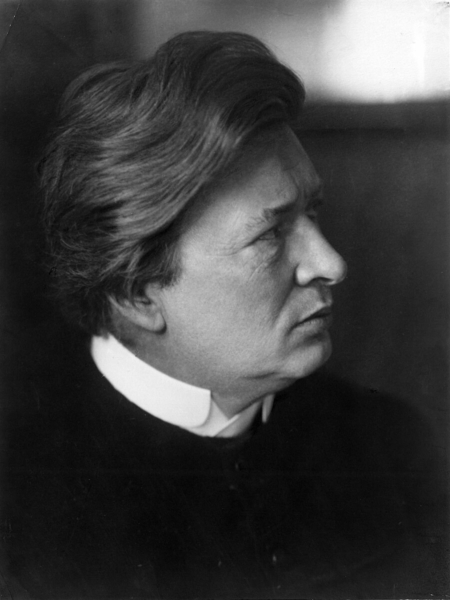Ferruccio Busoni (1866–1924)
Busoni war ein epochaler, europäischer Künstler: wie kaum ein anderer produktiver Musiker seiner Zeit vernetzt mit den aktuellen Szenen der anderen Künste.
1866-1873
Am 1. April wird Ferruccio Dante Michelangelo Benvenuto Busoni in Empoli (bei Florenz) als Sohn eines italienischen Klarinettenvirtuosen (Ferdinando) und einer deutschstämmigen Mutter (Anna Weiss aus Triest) geboren. Erstes pianistisches Auftreten als Wunderkind 1873 in Triest. Aus dieser Zeit stammen auch die frühesten Kompositionen. Unterricht (Klavier) zuerst bei der Mutter, dann beim Vater.
1875-1883
Studien in Wien am Konservatorium. Nach eigener Aussage bis 1879 ca. 50 bis 60 Konzerte des Wunderkinds. Weitere Studien (Komposition) von 1879-81 bei Wilhelm Mayer-Remy in Graz. Anschließend (1881) Diplom für Klavierspiel und Komposition der Accademia Filarmonica di Bologna, wo (1883) auch, gefördert durch Arrigo Boito, seine umfängliche Kantate "Il Sabato del Villaggio" (nach Leopardi) aufgeführt wird.
1886-1888
Busoni lässt sich in Leipzig nieder, versucht einen Namen als Pianist und Komponist zu erwerben. Erste Bachbearbeitung für Klavier 1888.
1888-1894
Busoni übernimmt eine Klavierprofessur am Konservatorium in Helsinki (bis 1890). Er gewinnt den Rubinsteinpreis in Moskau (erster Preis für Komposition, zweiter Preis für Klavierspiel). Als Klavierlehrer nach Moskau, dann (1891) nach Boston und ab 1892 Übersiedlung nach New York.
1894-1898
Übersiedlung nach Berlin. Von dort aus Vorbereitung seines endgültigen Durchbruchs zu einem der bedeutendsten Pianisten seiner Zeit. Der Komponist tritt merklich zurück.
1898-1913
Neubesinnung auf die kompositorische Arbeit mit seinem "ideellen" opus 1, der zweiten Violinsonate op. 36a (1898). Seitdem auch verstärkt theoretische Reflexionen seines ästhetischen Standorts, was 1907 mit dem ersten Erscheinen des "Entwurfs einer neuen Ästhetik der Tonkunst" seinen kühnsten Ausdruck findet. Er betätigt sich als Veranstalter von insgesamt 12 Orchesterkonzerten mit den Berliner Philharmonikern zur Präsentation neuer Musik (1902-1909). Uraufführung des Klavierkonzerts mit Männerchor 1904 im vierten Konzert. Beginn der Arbeit am Textbuch des "Doktor Faust" 1910 (Beendigung 1914). Uraufführung der Oper "Die Brautwahl" 1912 in Hamburg.
1913-1914
Busoni wird Direktor des Liceo Musicale in Bologna. Erste Versuche zum "Arlecchino", Abschluss des Textbuchs im Oktober 1914.
1915-1920
Auf der Flucht vor dem europäischen Kriegstaumel stürzt er sich auf eine Amerikatournee (seine vierte). In den USA wird das "Rondo Arlecchinesco" vollendet (Uraufführung 1916 in Rom unter Leitung des Komponisten). Rückkehr noch 1915 nach Europa und Niederlassung im neutralen Zürich; dort Abschluss der Partitur des "Arlecchino" 1916 und Uraufführung zusammen mit der zur Oper umgearbeiteten "Turandot" am 11. Mai im Stadttheater Zürich. Ab 1916 auch Arbeit an der Komposition des "Doktor Faust".
1920-1924
Rückkehr nach Berlin. Dort ab 1921 eine Meisterklasse für Komposition an der Akademie der Künste. Weiterarbeit am "Faust", der, vollendet von Philipp Jarnach, 1925 in Dresden uraufgeführt wird. Tod am 27. Juli 1924.









